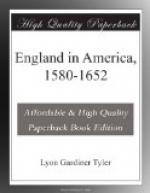In March, 1629, Captain West went back to England, and a new commission was issued to Sir John Harvey as governor.[37] He did not come to the colony till the next year, and in the interval Dr. John Pott acted as his deputy. At the assembly called by Pott in October, 1629, the growth of the colony was represented by twenty-three settlements as against eleven ten years before. As in England, there were two branches of the law-making body, a House of Burgesses, made up of the representatives of the people, and an upper house consisting of the governor and council. In the constitution of the popular branch there was no fixed number of delegates, but each settlement had as many as it chose to pay the expenses of, a custom which prevailed until 1660, when the number of burgesses was limited to two members for each county and one member for Jamestown.[38]
In March, 1630, Harvey arrived, and Pott’s former dignity as governor did not save him from a mortifying experience. The council was not only an upper house of legislation, but the supreme court of the colony, and in July, 1630, Pott was arraigned before this tribunal for stealing cattle, and declared guilty. Perhaps Harvey realized that injustice was done, for he suspended the sentence, and on petition to the king the case was re-examined in England by the commissioners for Virginia, who decided that “condemning Pott of felony was very rigorous if not erroneous."[39]
The year 1630 was the beginning of a general movement of emigration northward, and in October Chiskiack, an Indian district on the south side of the York, about twenty-seven miles below the forks of the river where Opechancanough resided, was occupied in force. So rapid was the course of population that in less than two years this first settlement upon the York was divided into Chiskiack and York. One year after Chiskiack was settled, Kent Island in Chesapeake Bay was occupied by a company under William Claiborne, the secretary of state; and in 1632 Middle Plantation (afterwards Williamsburg) was laid out and defended by a line of palisades from tide-water to tide-water.[40]
Meanwhile, the old colonial parties did not cease to strive with one another in England. Harvey had been appointed by the vacillating Charles to please the former court party, but during the quarrel with his Parliament over the Petition of Right he became anxious again to conciliate the colonists and the members of the old company; and in May, 1631, he appointed[41] a new commission, consisting of the earls of Dorset and Danby, Sir John Danvers, Sir Dudley Digges, John Ferrar, Sir Francis Wyatt, and others, to advise him upon “some course for establishing the advancement of the plantation of Virginia.” This commission had many consultations, and unanimously resolved to recommend to the king the renewal of the charter of 1612 with all its former privileges—except the form of government, which was to be exercised by the king through a council in London and a governor and council in Virginia, both appointed by him.




